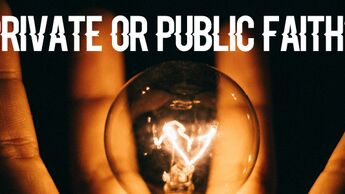
With the gradual increase in secularisation, living a Christian faith in Scotland today is being squeezed. Secularists iterate that faith is to solely be a privately held matter and that it should not spill over into public life in any way. Their argument being that because the church’s numbers are lower than they’ve ever been, by what criteria should we have privilege in public spaces? What is worrisome is that many churches have imbibed this narrative. For such Christians faith is a series of conviction check boxes that are assented to, but which have no relevance to modern day society in any way, other than convincing others to assent to the same list in their internal hearts. As time passes, the need for following Jesus of Nazareth is solely confined to the interior breast and the majority of Scots see no compunction at all to sign up while narcissism and hedonism remain King and Queen.
Jesus on the other hand has other ideas about this:
‘You are the light of the world. A city built on a hill cannot be hidden. No one after lighting a lamp puts it under the bushel basket, but on the lampstand, and it gives light to all in the house. In the same way, let your light shine before others, so that they may see your good works and give glory to your Father in heaven’ (Matt. 5.14-16).
To hide something that is so good, so meaningful, so life-giving is frankly absurd. Followers of Jesus are to let beams of light splinter the public darkness so that there’s no hiding the reality of faith. Nobody should be of any doubt that you are living a life that is governed by a King who is over all.
Add to this Jesus’ confidence that such an overflow will have an effect. People will at some stage recognise that such living is worthy of pointing to our God as the reason for our unique lifestyles. Jesus is not conjuring up some new idea here. He is doing nothing more than borrowing what God’s people have been doing for aeons.
Take Daniel for example. Daniel is far from home, working in a foreign and hostile land that does not worship the God of Israel. He interprets his pagan King’s disturbing dream with precision after putting himself forward: ‘Daniel went in and requested that the king give him time and he would tell the king the interpretation’ (Dan. 2.16). That’s publicly bold! That is letting the light of his faith shine forth. That would indeed be bravery in and of itself, but ultimately this arrogant King came to the conclusion that, ‘Truly, your God is God of gods and Lord of kings and a revealer of mysteries, for you have been able to reveal this mystery!’ (Dan. 2.47).
The secular atmosphere in Scotland for some time has had a lasting affect on followers of Jesus. We tread quietly around the place, not disclosing our light. Some of us are embarrassed, not wishing to be mocked. Some of us lack any kind of confidence to talk freely about what makes life tick according to the God we worship. Such anticipated responses from people are not unfounded, particularly in the media and politics. We will sometimes be scorned. And in such cases blessed are we for being worthy of such mockery. Faith as a result among Scots becomes quietly private. No wonder so few people know about him in Scotland today!
Should our faith be private or public?
Actually this is not an either/or question. The deeply help belief of Jesus having been raised from the dead within must always flow into public behaviour. He implores this of us. We must follow.
Don’t forget our heritage! We were those who in Roman times provided honourable burials for discarded babies or social rejects who had been thrown on the rubbish tip once dead. We were noticed.
We were the ones who set up trade unions so that workers were not trodden over by factory owners who held all the power. We were the ones who argued that children shouldn’t be in dangerous workplaces. We were the ones who had working hours capped at a certain limit so people could rest and have time with their families. We were the ones who called for the means and goals of work to have an inherent beauty to it. We were the ones who set up universal schooling, and particularly the education of the poor. We were the ones who ensured that the United Kingdom has freedom of expression of religion and belief.
Should we have a private or a public faith?
Answer = Give your light to all the house.

Dr Stuart Weir is National Director of CARE for Scotland

Share story
Private or Public Faith?